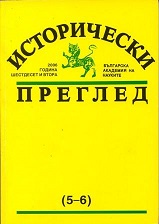Западноевропейците в представите на средновековния българин
The Mediaeval Bulgarians’ Notion of the Westeuropeans
Author(s): Petar AngelovSubject(s): History
Published by: Институт за исторически изследвания - Българска академия на науките
Summary/Abstract: The continuous communication between the nations of Europe in the Middle Ages resulted in the establishment of firmly rooted mutual perceptions and prejudice, which were not wiped out or transformed in their entirety by the global changes in the course of history. The study of these perceptions and their role in the progress of society is without doubt of great value, since in many cases it is crucial as to the better understanding of paramount events in the economic, political and cultural spheres of life when a particular nation is concerned. Regardless of the fact, Bulgaria in the given period could hardly be defined as a multiethnic society, as for instance was Byzantium, written sources available duly imply the marked presence of various ethnic communities from abroad on Bulgarian soil. These were, on the one hand, the survived descendents of the ancient Thracian folk to turn Hellenic or Roman, on the other – a certain number of Greeks, Jews, as well as a considerable number of westerners, who were generally labeled “Francs”. A number of nations were referenced to that particular term, like for instance the French, German, Italian, Flemish, etc. The origins of this ethnonym to comprise all folk hailing from the West, take us to the epoch of the powerful Carolingian Empire which, in a certain period of time, in matters of common politics unified a considerable part of the West- European The archaic-termed ethnonym „the Franks” is obviously tinged with a deeper shade of meaning and would refer not only to origins rooted in the West in general, but also to a peculiar behaviour and attitude. We could draw the conclusion that the concept of the western nations in mediaeval Bulgaria is formed under the impression of various considerations and circumstances. It is without a doubt that its origin is rooted in the earliest dealings of the Slavs and Proto-Bulgarians with the German tribes back in the age of the great migration of peoples. Subsequently, the image of „the man of the West” was built up under the impact of the common boundary and the political contacts, which Bulgaria established with the powerful Carolingian Empire. Other key factors in the formation of this concept were undoubtedly the connections between Bulgaria and Rome in the immediate aftermath of the conversion, the first three Crusades to pass over the Bulgarian lands, the schism of 1054 dividing the church into two factions – a western and an eastern one. It was just the time when the Old-Bulgarian literature gradually adopted the idea that the Christianity professed by westerners essentially was a heresy, termed with the phrasing „Latin heresy”. Among the terms used to designate people from Western Europe, a particularly fixed one turned out to be „the Latins”, which left its trace in the Bulgarian folklore. There are a number of popular songs included in the Heroic epic poetic cycle of Krali Marko, where references to Latins, Latinska zemya (land), Latina grada (town), ...
Journal: Исторически преглед
- Issue Year: 2011
- Issue No: 5-6
- Page Range: 103-114
- Page Count: 12
- Language: Bulgarian
- Content File-PDF

